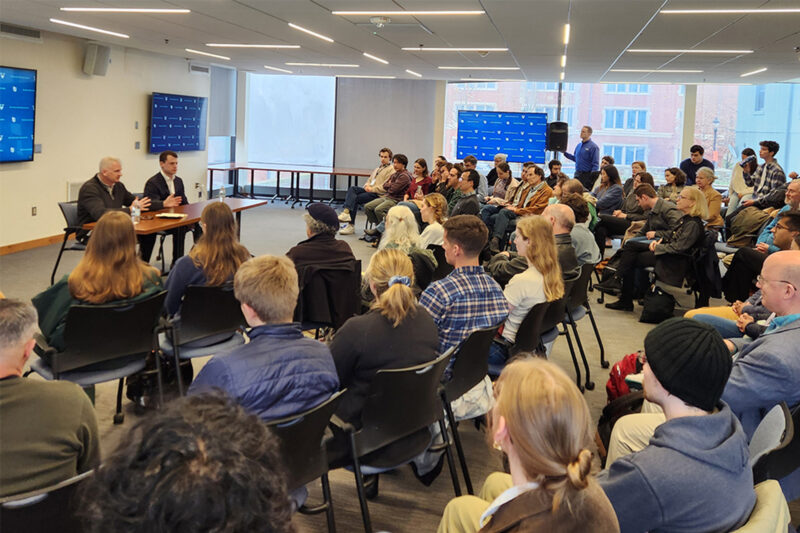The Blue Center for Global Strategic Assessment hosted a discussion on April 3 on the origins and present state of Russia’s war in Ukraine with Timothy Snyder, the Richard C. Levin Professor of History and Global Affairs at Yale, and David Shimer, formerly of the White House National Security Council.
Snyder is a historian of Central and Eastern European history and has become an internationally significant voice on the war since Russia’s full-scale invasion began in February 2022. Shimer, a Yale College graduate, served from 2021 to 2025 on the National Security Council, first as the director for Russian affairs, and then as the director for Eastern Europe and Ukraine. Shimer is currently an adjunct senior research scholar at Columbia University’s School of International and Public Affairs.
In the weeks leading up to the full-scale invasion, Shimer led the government’s contingency-planning “tiger team,” which planned the U.S.’s response to potential Russian military action. A significant part of that planning, Shimer said, was devoted to conversations on how to counter Russian disinformation about the war’s premises.
“In the weeks immediately prior to the invasion’s launch, we publicized U.S. intelligence, basically warning that Russia had a premeditated invasion plan against Ukraine,” Shimer explained. “So that way, if Russia were to try to play some sort of pretext for disinformation, as they do, the world would see through it and understand that this was just a blatant, brazen, unprovoked act of aggression.”
Snyder recounted conversations with Ukrainian friends at the start of the invasion. Describing “shock” as a luxury for those not immediately affected by the military incursion, he noted that Ukrainians and Eastern European friends were often the ones reassuring their Western peers at the start of the war.
Discussing the present state of the war, Snyder expressed alarm over the Trump administration’s decision to frame its talks with Russia as a “peace process” to end the fighting.
“The very fact that it’s Russians and Americans [in negotiations] means that it’s not a peace process, because a peace process would be Ukrainians and Russians. While we’re watching this ‘golden vision’ of a peace process, there’s an actual war going on,” Snyder said. “And in that actual war, Ukrainians depend upon actual things which we are no longer giving them” — referencing the U.S. government’s decision to halt certain military aid to Ukraine.
The two speakers are longtime interlocutors. Snyder opened the conversation by remarking on his pride for Shimer, his former student. The discussion, structured as a conversation with an audience question portion at the end, was convened by the Blue Center as part of its ongoing Co-Lectures in the Theory and Practice of Statecraft series.
In an op-ed released in the Yale Daily News the day after the co-lecture, Snyder announced that while his family would relocate to Toronto for personal reasons in the coming year and he would take a position on the faculty at the University of Toronto, he will remain affiliated with Yale as a visiting professor at the Blue Center.
